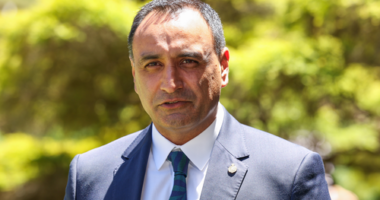Share this @internewscast.com
“The battle against fraud and scams demands ongoing innovation, adaptability, and collaboration within the payments industry,” stated Bullock during the Bradfield Oration, as reported by the Daily Telegraph this morning. “Fraudsters are constantly evolving their tactics to access people’s data and money.”

Bullock highlighted the pressing need to safeguard card users from the advancements in quantum computing, which is anticipated to compromise existing encryption methods in the future.
“To address this, it is crucial to transition card payments to the advanced encryption standard (AES), which offers a quantum-safe solution,” he emphasized.
A study from the University of NSW last year revealed that while current IT network security algorithms, which can take modern supercomputers millions of years to crack, may be quickly decrypted by quantum computing, potentially in just days or even hours.
Lead researcher Dr. Fida Hasan explained, “IT networks employing widely-used cryptographic security algorithms, such as RSA, remain secure against hacking attempts, even with supercomputers.”

Dr. Hasan further noted, “With conventional supercomputers, it would take millions or even billions of years to breach these security systems. However, quantum computers could drastically reduce the time required to decrypt these algorithms, potentially to as little as a day or less.”
“There are some predictions that suggest a quantum computer, with the ability to rapidly decrypt cryptographic security algorithms, could be developed within the next decade.”
When asked whether the emerging technology was the biggest threat to Australia’s payments system, Bullock admitted it is frightening.
“It’s something I worry about,” she said.
“If you believe what they say (about) quantum computing, what takes 200 years to decrypt now, to break, will take a matter of minutes. So it is a big threat.
“But I have to say … advanced encryption standards have been developed to meet that challenge of quantum computing.
“At the moment, we trust our financial institutions to keep our data safe and they do that through encryption.
“So it is a worry that we need to make sure we keep up with that quantum computing situation, because otherwise it’s not safe.”
Australians lost a combined $173.8 million to scams and financial fraud in the first half of the year, up 26 per cent from the same time last year, according to the ACCC.
“Technology is helping scammers reach more people than ever before and we see scams becoming more sophisticated and harder for people to detect,” ACCC deputy chair Catriona Lowe said in August.












